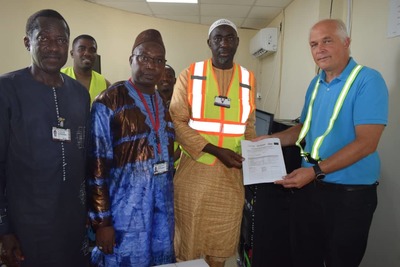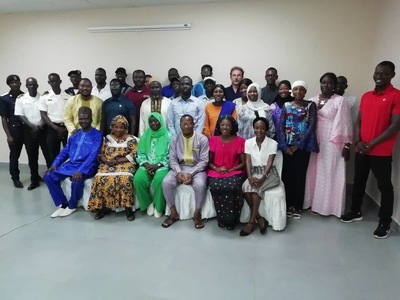MoFWR kick-starts technical retreat on the terminal evaluation of Fisheries, Aquaculture, Sector Strategic Plan

The Ministry of Fisheries, Water Resources and National Assembly Matters (MoFWR-NAMs) on Tuesday, 28th September 2021 commenced a five (5) day technical retreat on the Terminal Evaluation of Fisheries and Aquaculture Policy and Sector Strategic Plan (2017-2021).
The technical session that ends on 2nd of October 2021, brought together stakeholders from various ministries and institutions to critically scrutinise the draft evaluation report, provide inputs and recommendations during the various presentations and discussions in order to develop a consultative replacement policy and strategic plan.
Speaking at the opening ceremony, Omar S.M. Gibba, Permanent Secretary (PS), MoFWR-NAMs, explained that the current Fisheries and Aquaculture Policy document is under review and a consultant was contracted to undertake a Terminal Evaluation of the expired Fisheries and Aquaculture Policy (2007-2016) and Strategic Plan (2017-2021).
“With a view to documenting the experience in the implementation of the Policy and Strategic Plan, and using the results of the evaluation to inform the development of a new policy framework and strategic plan for the sector,” he added.
PS Gibba further narrated that due to the geographical nature of this country, fishing activities are conducted both coastal and inland.
According to him, the sector produces the cheapest source of animal protein to the vast majority of Gambians with an estimated national per capita fish consumption of 25 kilograms per annum around the coastal areas and 9 kilograms in the inland areas.
Anna Mbenga Cham, Director of Fisheries, deliberated on the importance of the Fisheries and Aquaculture sector to sustainable economic development of the country.
“As it has the potential to address poverty and gender inequality, food security and livelihoods in rural areas, and improve the nutrition security of the population, employment creation and increase foreign exchange earnings through value addition and exportation,” she added.
Sirra Njai Sanyang, Programme Officer, FAO, narrated that FAO is positioned to support its members to promote responsible and sustainable development in Fisheries and Aquaculture.
FAO supports following the Code of Responsible Fisheries, the management and conservation of aquatic resources; utilization, marketing and trade of fishery products; and development of Fisheries and Aquaculture Policies.


